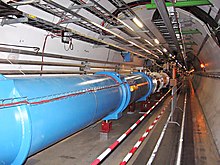Large Hadron Collider restarted
Saturday, November 21, 2009
The Large Hadron Collider, a vast scientific experiment to smash together sub-atomic particles, moved a step closer to its goal on Friday night. Physicists announced they had sent protons all the way round the 27 km ring beneath the France–Switzerland border, for the first time since a major failure 14 months ago.

Image: Julian Herzog.
The experiment, the largest of its kind in the world, was first switched on with great fanfare in September 2008, but suffered an electrical fault just nine days later. This caused a leak of ultra-cold liquid helium, resulting in severe damage. Repairs have cost approximately £24 million, on top of the £6 billion spent originally.
Particles were injected into the ring at around 1500 GMT on Friday, and just after 1930 GMT the first completed circuit was confirmed. Further testing is planned for Saturday.
"We've still got some way to go before physics can begin, but with this milestone we're well on the way," stated Rolf Heuer, director-general of CERN, the European research group running the collider.
The Large Hadron Collider is designed to smash together particles at almost the speed of light, creating conditions similar to those only moments after the Big Bang. By studying these collisions, scientists hope to shed light on theories such as supersymmetry and the Higgs boson. The six physicists Guralnik, Hagen, Kibble, Higgs, Brout, and Englert who predicted this particle in 1964 were recently awarded the 2010 J. J. Sakurai Prize for Theoretical Particle Physics for this work.
Barring further problems, the first collisions are scheduled to take place in January next year.
Sources
- Paul Rincon. "Re-start for 'Big Bang' machine" — BBC News Online, November 20, 2009
- "CERN atom-smasher restarts after 14-month hiatus: official" — AFP, November 20, 2009
- Ian Sample. "Scientists at Cern hold their breath as they prepare to fire up the LHC" — guardian.co.uk, November 18, 2009
- "APS 2010 Sakurai Prize winners" — American Physical Society, November 20, 2009
